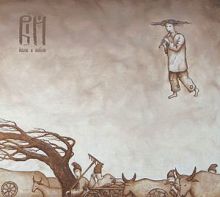Kyiv-based band Viy has been playing for more than 20 years now. During that time (which was not very favorable for independent rock music), it managed not only to survive, but also to develop its own, easily recognizable, style.
The release of their album I walked the skies was not accompanied by any visible support from the media. The band gave a concert at one of Kyiv’s pubs, having beforehand released the concert’s program for free distribution on the Net.
Viy feels distinctly traditional in its music, as well as in its lyrics (the latter are authored, with several exceptions, by the band’s founder and vocalist Dmytro Dobry-Vechir). Dmytro’s and his companion’s ideology is characteristic for patriotically-leaning bands; their patriotism, however, is rather cultural than political. The Ukrainian language suits their topics, which mostly rely on proven national archetypes: from the forest Gothic of Gogol’s Evenings on a Farm near Dikanka (in the song “In a Dark Forest at Night,” about love with mermaid), to the tragic pages of history (“Lullaby-33”, about the Great Famine of 1933). At the same time, musical influence of national folklore is almost impalpable among the predominance of established styles: rhythm and blues, rock ballad, country. The album opens with an instrumental composition “Goodbye My Revolution 1,” a sentimental waltz on accordion, with superimposed locomotive horn signals and the murmur of street mobs — combined, it sounds like a semi-nostalgic soundtrack to a movie about the turbulent 1920s. It continues with pan-Ukrainian fears and passions, which develop into universal ones.
“Cut-off Head” is a song in which the text, designed in the logic of nightmares, is eerily romantic. I walked the skies is slow, somewhat anarchic, with a touch of melancholic sympathy to those who are “still in the army and in prison.”
Dmytro has the voice of a tired macho, quite suitable for such stern male ballads, but the album includes a lot of songs that require a broader range of emotions. For example, “Lullaby-33” is not just a lullaby, it is also a requiem for all the victims of that terrible year, but it is played too fast, without sufficient drama. Yet the text is truly thrilling. On the other hand, their love-song “August Is Burning Out, In a Dark Forest at Night,” lacks tenderness and softness in its instrumental part.
Even without direct folklore stylizations, Viy remains confident, mixing ethnic elements in different proportions. The Frank-Slavonic-Irish “Pentecostal Song” (text composed by Lesia Roy), ending with a bird song, sounds quite organic. The crows’ caw is a great addition to the hard folk-rock “Devilish Force” — where famous Gogolian devilry comes out. Everything is in its place in “Leave the Room” too; this song is a respectful interpretation of Ukrainian modernist poetry genius Bohdan-Ihor Antonych. The album ends with the same nostalgic accordion, this time it accompanies the song “Goodbye My Revolution 2”; it is good conclusion for the program — a voyage through space, magical and lyrical.
Viy is one of the few genuinely romantic bands on the Ukrainian rock stage. And that’s why it is so good.








